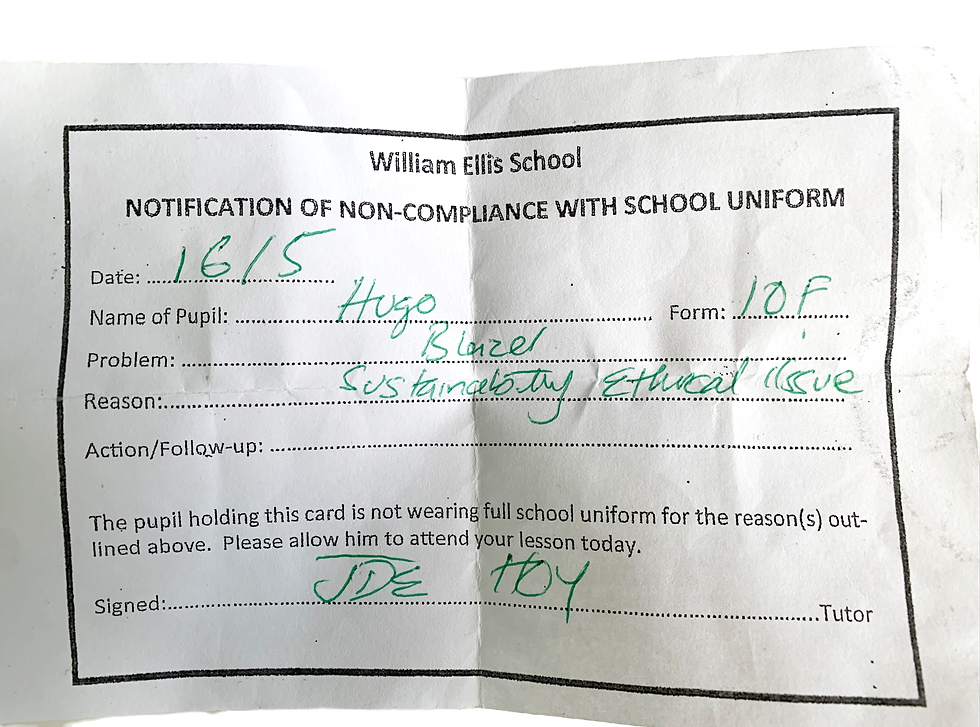My child refused to wear the uniform, yours can to
- noplasticuniforms
- Sep 3
- 4 min read

Parents, you don’t have to buy your child’s synthetic school uniform. Most school uniform items are made of polyester, a fabric that is made from fossil fuels. It is highly damaging to the environment, polluting the atmosphere with carbon, and the water and air with microplastic fibres and chemicals. If you care about the environment, UK law protects your right to refuse to buy uniform items made from polyester.
When my son Hugo Keane was in year 7, he did an environmental impact analysis of three items of his school uniform—the blazer, PE t-shirt and PE shorts—now on this website. Hugo calculated that when the 125 students in his year 7 cohort buy these three polyester items, they release 1276.5kg of CO2 into the atmosphere, or enough to melt 3m2 of Arctic ice. Our children are literally wearing climate change. For several years, London has seen record-setting heat at the beginning and end of the school year, showing, as my son stated in an interview, that “our blazers are making it too hot… to wear our blazers.”
In addition to polluting the atmosphere with carbon, polyester also releases tiny fibres in the washing machine and in the air while our children are wearing them. Hugo calculated that for his year group this amounts to at least 6.4 billion microplastics in one year, or enough to feed half of Camden’s population its yearly diet of microplastics. Microplastic fibres make up 35% of the microplastics in our waters, more than any other type. By 2050, there could be as much as 22 million tonnes in the ocean. They harm fish and animals, including those we eat, and hinder photosynthesis in plants, threatening our food supply. Microplastic pollution is also having an effect on us, with our children at greater risk: they have been found all over our bodies, and studies are showing links to health problems.
According to UK law, we cannot be forced to participate in this carbon and microplastic pollution. A 2009 Employment Appeal Tribunal Judgment (in the case Grainger PLC & Ors v. Nicholson) found that the belief that we as individuals have a duty to take actions to prevent climate change enjoys the same status as a religious belief under the Equality Act. We can no more be forced to buy polyester than vegetarians can be made to eat meat, or Sikhs to remove turbans. This is also reflected in the government’s guidance to schools that they should consider requests of individual students “to accommodate their religion or belief.”
During Hugo’s first year of secondary school, uniform policies were relaxed due to COVID. But when the school reimposed the requirement to wear the school blazer, my husband and I wrote to his Head of Year and said that we cannot in all good conscience buy the polyester items of his uniform knowing of the damage to the environment that this will cause. Hugo was a Student Councillor and had begun advocating for sustainable uniforms with the Student Council and Governing Board. So we also wrote that we wanted to support his advocacy—encouraging leadership is one of the school’s stated values—and attached his presentation. We sent him into school with a letter for him to show to teachers explaining why he wasn’t wearing the blazer or PE kit.
In her response, his Head of Year gushed that she “can not express over email just how incredible and (persuasive!) this presentation is,” and said that the school “respect[s] Hugo’s decision to not wear the Blazer.” He was given a card that stated that his reason for non-compliance with uniform policy is environmental and ethical. He was always careful to carry the card with him, as he did get stopped in the hallways by teachers who wanted to know why he wasn’t wearing a blazer. This tapered off after the first few weeks once they learned about his exemption. His PE teacher graciously provided him with a branded cotton t-shirt, and he wore his own cotton shorts, but his teacher also offered that we could buy a polo shirt and shorts in the school colours. There would later be friction with the school as Hugo advocated to get it to change to a sustainable uniform, which led to our deputation before Camden Council and an amendment to a bill before Parliament, but he enjoyed a great deal of support from many teachers.
We had to repeat the process of writing to the Head of Year in year 9, but by years 10 and 11, his refusal to wear the blazer was no longer questioned. In his five years of secondary school, Hugo never wore his school’s branded blazer or PE kit. It takes courage for a tween to stand out. I am very proud of my son for standing alone in his school on this issue, and advocating for it in the face of institutional resistance. He has set an important precedent that students cannot be forced to contribute to climate change and pollution.
If you would like to support your children to refuse to wear polyester uniform items or advocate for a sustainable uniform, have a look at resources on the Calculate and Take Action tabs of our website. We are really interested in your experiences, so please reach out at noplasticuniforms@gmail.com.

